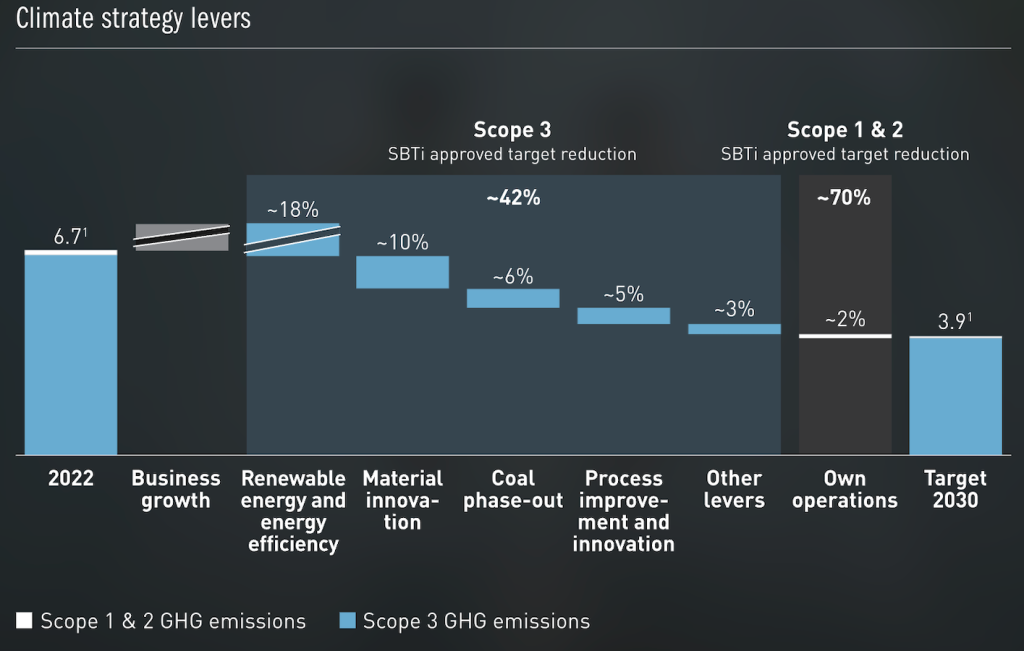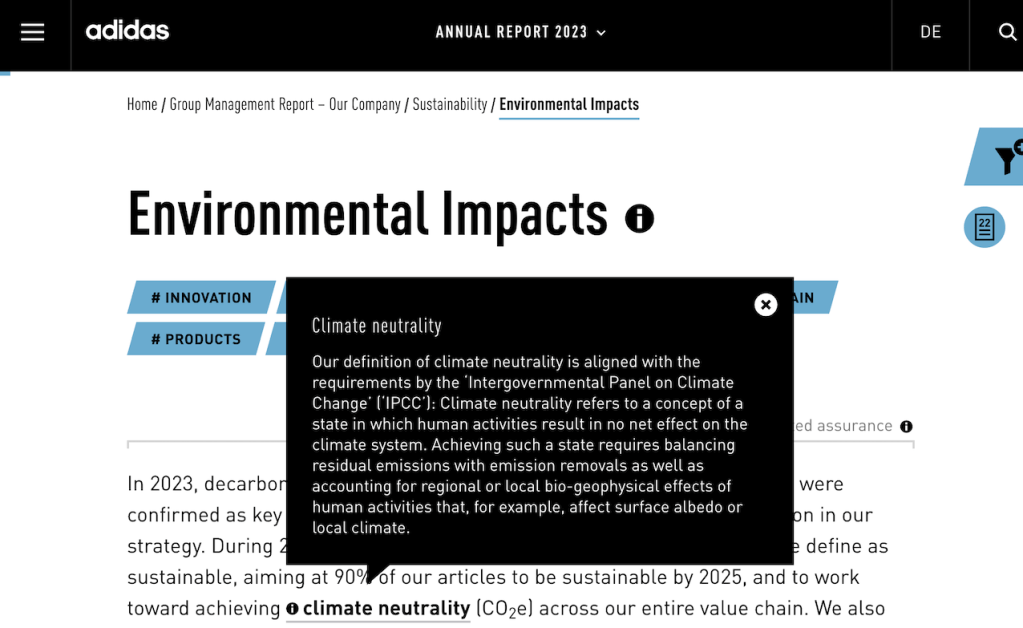Adidas greenwashing judgment offers warnings about climate claims
The "Wild Wild West" era of sustainability communications faces new legal challenges. Here's how to avoid fuzzy language and risks. Read More

Key takeaways:
- A German court found Adidas guilty of vague climate claims without defined pathways or offset disclosures.
- Experts warn of “greenhushing” but encourage clearer communication.
- New legal challenges and scrutiny around sustainability marketing and reporting are emerging.
Adidas maintains standard best practices to reduce its contributions to the climate crisis, including grounding net zero targets in science. However, that didn’t stop the company from losing a greenwashing lawsuit. On March 25, the Nuremberg-Fürth Regional Court in Germany found Adidas guilty for failing to detail how it would achieve “climate neutrality” by 2050.
Despite the lack of a fine, the bad press for Adidas brings repercussions for other companies advertising climate goals. The suit uniquely targeted a broad, long-term ambition that underpins an overarching corporate sustainability strategy, rather than a specific product claim.
“It is a warning shot for other textile companies to make sure they can substantiate their claims and to move away from vague terminology,” said Richard Wielechowski, senior analyst at Planet Tracker in London. “There is a challenge here in that brands that are trying to do something and talking about it are the ones risking being hit with litigation, whilst those doing nothing get ignored. This might encourage greenhushing.”
Such rulings bring cons and pros for corporate sustainability work, according to Suzanne Shelton, senior partner at ERM Shelton, in Knoxville, Tennessee. “I worry companies will get demotivated from doing the arduous, trailblazing work of decarbonizing, and maybe we’re not giving enough grace for companies to find their footing and communicate as they go,” she said.
“On the other hand, we do need to communicate with consumers in a crystal clear way – our data has shown for years that nobody likes to find out that environmental claims that played a role in their decision to purchase were misleading (it’s damaging to brands).”

Deception or imprecision?
Environmental Action Germany, or Deutsche Umwelthilfe (DUH), filed the suit last fall, accusing Adidas of deception. “Companies may not simply communicate sustainability goals (or climate neutrality targets) without explaining how they intend to achieve them,” said Agnes Sauter, DUH head of ecological market surveillance. “The ruling shows that transparency and comprehensible plans for how sustainability goals are to be achieved are essential to create trust and to ensure legal compliance.”
Adidas shared a statement with Trellis: “The decision relates exclusively to a specific wording on our website, which we already adjusted in August 2024.”
The Herzogenaurach, Germany-based brand has not altered its plans to reduce emissions. “Progress is already clearly visible: since 2022, absolute emissions including the supply chain have fallen by 20 percent,” the Adidas spokesman added.
Adidas is among 500 apparel companies with third-party approval by the Science-based Targets initiative for a net zero target. The company aligned that 2050 deadline with an ambitious, Paris Agreement level of a 1.5 degrees Celsius rise in global temperatures.
The specific legal complaint was that Adidas failed to define “climate neutrality” or admit to using offsets.
A year-old Adidas web page about its 2023 environmental impacts now addresses both issues by defining “climate neutrality” as a concept that may balance “residual emissions with emission removals as well as accounting for regional or local bio-geophysical effects of human activities.”

Adidas discloses emissions steps
Adidas’s 2024 annual report, issued March 5, does not prominently mention “climate neutrality.” It does, however, detail activities to meet net zero across Scopes 1, 2 and 3 by 2050. That goal includes a 42 percent reduction in indirect Scope 3 pollution by 2030 over 2022 levels, and a 70 percent drop for both Scope 1 direct emissions and Scope 2 energy emissions.
Scope 3 is a special focus for Adidas, whose energy-intensive upstream activities create 87 percent of overall climate emissions. Progress there hinges upon encouraging suppliers to adopt renewable energy and abandon coal-fired boilers. To that end, more than half of the brand’s direct suppliers or subcontracting suppliers had made energy upgrades by the end of 2024.
As for efforts to use lower carbon materials, Adidas sources 99 percent of its main material, fossil fuel-based polyester, from recycled sources. By 2030, it plans to derive 10 percent of its recycled polyester from used textiles. Upcycled marine plastic waste, including fishing nets, is a major source today.
Beware making ‘aspirational’ sustainability claims
Experts note that more legal challenges to insubstantiated expressions of ambitious climate goals may increasingly emerge, especially if the European Union’s Green Claims Directive becomes regulation as expected later this year. Already in January, the EU Corporate Sustainability Reporting Directive (CSRD) began requiring companies to share their climate transition plans or provide reasons for why they have not.
“The same types of cases as the Adidas case are happening in the United States,” said Katie Bond, partner at the Keller and Heckman law firm in Washington, D.C. “There are, for instance, several prominent cases on so-called ‘aspirational’ claims and there are lots of cases on carbon-related claims.”
A leading example of aspirational claims comes from a 2023 challenge, by an arm of the nonprofit BBB National Programs, to meat giant JBS Holdings of Greeley, Colorado. In response, the company modified language about a “Global Commitment to Achieve Net-Zero Greenhouse Gas Emissions by 2040.” The new language replaced “commitment” with fuzzier terms, such as “ambition” and “goal.”
JBS had also made claims such as, “We’re setting time-bound, science-based targets and backing them up with $1 billion in capital over the next decade.” The New York Attorney General filed suit against the revisions. In January, however, the court dismissed, “finding that without the ‘commitment language,’ the issue seemed to be resolved,” Bond said.
Meanwhile, cases over “carbon neutral” claims have attacked Delta, Evian, Apple and Clif Bar. It remains to be seen how these will fare, but companies can reduce risk by explaining exactly what they mean by “carbon neutral” or “carbon negative,” according to Bond.
In fashion, fits and starts for greenwashing challenges
Fashion brands have withstood high-profile greenwashing challenges in recent years. A judge last summer dismissed a class action lawsuit against Nike for its “Move to Zero” initiative and claims about sustainable materials.
Two separate 2022 class action lawsuits, in New York and Missouri, challenged the language in H&M’s “conscious choice” collection. The cases ultimately fizzled out, but companies should learn from them what wording and substantiation helped H&M’s defense, according to attorney Bond.
“In H&M in particular it seemed to make a difference that the company labeled its clothing ‘more sustainable’ and explained why, versus claiming that its clothing is across-the-board ‘sustainable,’” she said. “I think compliance lawyers like me have been saying for a long time to be wary of ‘big’ claims like ‘sustainable’ and ‘eco friendly.’”
Meanwhile, the U.S. Federal Trade Commission has been working behind the scenes to make the first updates since 2012 to its Green Guides. Corporate legal teams, and activists, follow the guides to gauge the potential liability of businesses’ environmental claims. The guides are expected to refresh in the next few years, if not sooner.
“I’m afraid the sustainability communications sector has been the Wild Wild West for a long time, and most generalist ad agencies simply don’t realize they’re overstating claims when they do,” Shelton said. “So it is important for regulators to get guard rails in place, as is happening in both the EU and U.K., and for companies and their comms agencies to get the message that sustainability is no place for hyperbole.”

















